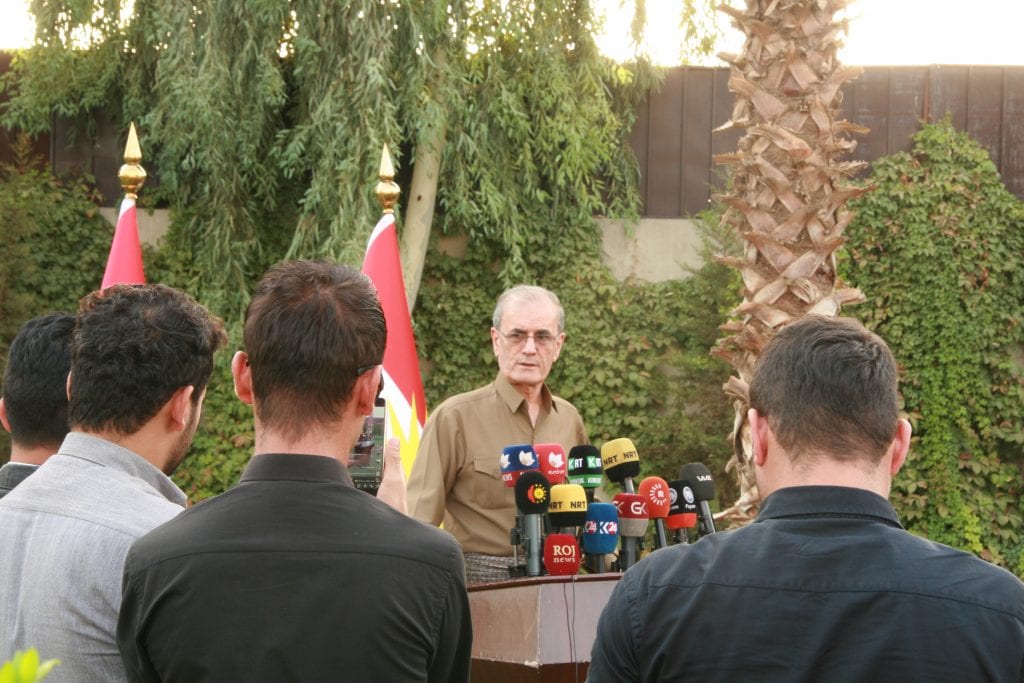In Memoriam and Discussion of Kurdish Politics at UCF

Dr. Najmaldin Karim holding a press conference in 2017.
The Kurdish Political Studies Program (KPSP) at the School of Politics, Security, and International Affairs (SPSIA) hosted its annual Kurdish forum on November 20, 2020, during the UCF Global-sponsored International Education Week. The forum was dedicated to the memory of Dr. Najmaldin Karim (1949-2020). Dr. Karim was the former Governor of Kirkuk, Iraq, and a neurosurgeon in Washington D.C. KPSP exists thanks to his vision and generous support.
After the introductory remarks of Dr. Kerstin Hamann, Pegasus Professor & SPSIA Director at UCF, Ambassador Peter Galbraith, Dr. Gazi B. Zibari, and Joe Reeder, former US Under Secretary of the Army, reflected on the legacy of Dr. Karim and his achievements. A highly successful neurosurgeon, Dr. Karim remained dedicated to the Kurdish cause and people throughout his whole life. After these remarks, Dr. Hamann announced the new recipients of the Dr. Najmaldin Karim Fellowship, established in 2017: Sophia Griemert, a Biomedical Science major and a Cultural Anthropology minor, in spring 2021 and Mohammed Al Awwad, a Political Science major and a Philosophy minor, in fall 2021.
The panel event, moderated by Dr. Güneş Murat Tezcür, UCF’s Jalal Talabani Chair, had two distinguished speakers: Dr. Mesut Yeğen, Professor at Istanbul Şehir University, and Dr. Michiel Leezenberg, Professor at the University of Amsterdam. In his talk titled “Ethnopolitics to Geopolitics: The Turkish State and the Kurdish Question since 2015,” Dr. Yeğen discussed the five novel geopolitical components to consider when rethinking the Kurdish question in contemporary Turkey. The primary component is the revisionist foreign policy in Turkey after 2011. Turkey has been involved in cross-border military operations and supports proxy borders in several regional countries. Next, Turkey has substituted the authority of Iraqi and Syrian governments in border zones. Third, Turkey has established administrative governance that makes non-Turkish citizens subjects to its ideological and repressive apparatuses. Fourth, Turkey pursues demographic policies that result in the resettlement of Iraqi and Syrian Kurds. Finally, the Kurdish question in Turkey is now governed via perpetual emergency rule. Yeğen also commented on the sustainability of this geopolitical approach and pointed out the complex interplay of internal and external factors. As long as the regional political vacuum remains and the ties between Kurds around the region stay strong, the geopolitical approach will remain central to how Turkey deals with the Kurdish question domestically and externally.
In his talk titled “Beyond Oil: The Political Economy of the Kurdistan Region of Iraq,” Dr. Leezenberg argued that both Iraqi Kurdistan and Kurdish areas of Turkey have distinctive economic characteristics. In particular, he assessed the impacts of political economy on the relations between ruling parties and citizens in Iraqi Kurdistan. After offering a historical overview of the developments shaping economic relations in the region, he asked a series of questions about the limits of public protests in achieving change in the region. To address these questions, he suggested that the peculiar nature of political-economic relations need to be studied despite the lack of statistical data. Since the 1990s, the Iraqi Kurdistan economy has still not fully incorporated into the global capitalist system. Almost all transactions are conducted in cash with little transparency. Oil exports provide a crucial income but have to be sold on the black market because of the legal complications with the Iraqi government. The rise of a new bourgeoisie has generated new dependencies and clientelist relations limiting the role of this class in triggering political change. Similarly, the political mobilization capacity of Kurdish youth has remained unfilled. Leezenberg concluded by noting that the Kurdistan region is far from being economically independent even if its moral right to sovereignty is undisputed. The panel ended with a lively discussion with the audience.
The video streaming of the forum is available on the Kurdish Political Studies Program YouTube channel. To stay updated about the events, follow KPSP on Facebook (@KPSPatUCF), or visit the website.
Written by Sara Belligoni, Ph.D. Candidate in Security Studies at the School of Politics Security and International Affairs and Graduate Research Assistant at the Kurdish Political Studies Program.
